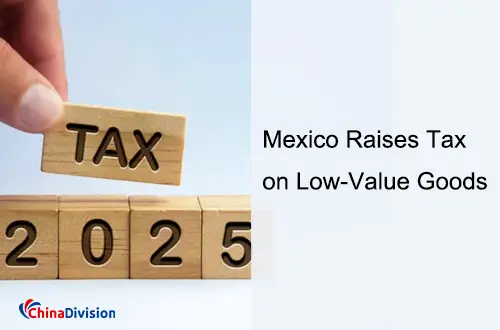Mexico's Tax Increase on Low-priced Goods and Response Options
As an international logistics and transportation fulfillment service provider, ChinaDivision is committed to keeping our B2B and e-commerce clients informed of major changes in global trade policy. One such change is coming soon—and if you ship to Mexico, it could have a significant impact on your profits.
Table of Contents
Effective August 15, 2025, the Mexican government will increase the import tax on low-priced goods (less than $2,500) from 19% to 33.5%, a 14.5 percentage point increase. This policy particularly impacts countries that do not have free trade agreements with Mexico, including China.
Who will be affected?
This change is expected to hit cross-border e-commerce sellers the hardest, especially those focusing on low-cost products, such as platforms like Shein and Temu, as well as the thousands of smaller sellers sourcing goods from China. For high-volume sellers, this could erode profit margins and force difficult decisions. Many businesses now face two difficult decisions:
Pass the tax increase on to consumers, raising prices and weakening their competitive advantage.
Absorb the costs to maintain pricing, but hitting already thin profit margins.
Neither option is ideal—which is why strategic logistics planning becomes crucial.
Why is Mexico taking this action?

Trade policy adjustments
Industry analysts believe this may be influenced by the United States, as some low-cost Chinese goods already use Mexico as a springboard to enter the US market.
Protecting local industries
Mexico may be seeking to shield domestic manufacturers from cheap imports.
Tax increases
Raising tariffs can help fund infrastructure, social programs, and other domestic priorities.
This policy change could reshape Mexico's e-commerce and retail landscape by accelerating the development of local supply chains, reducing tariff risks, and improving logistics efficiency.
What does this mean for B2B sellers and e-commerce companies?
Direct impacts include:
Higher costs for Chinese products
Disruption of current pricing and profit strategies
An urgent need to rethink logistics, sourcing, and fulfillment operations
This policy could reshape Mexico's cross-border e-commerce landscape, encouraging platforms and sellers to localize operations and restructure their supply chains.
How to Respond: ChinaDivision's Expert Advice
At ChinaDivision, we've begun helping clients develop proactive strategies to minimize the impact of this policy. Here are our recommendations:
- Rethink your supply chain and fulfillment strategy
Optimize your logistics channels to reduce the number of low-value goods shipped directly from China to Mexico. Consider:
Bulk shipments to overseas warehouses
Consolidation and unbundling strategies
Local fulfillment models to avoid high tariffs
Optimize product margins and prioritize high-value, low-volume categories (such as 3C accessories and household goods) to Mexican warehouses. Manage the value of each shipment to avoid excessive tax burdens on individual items. ChinaDivision offers flexible warehousing and fulfillment options in international markets, helping you reduce your reliance on direct cross-border shipping.
- Explore local partnerships
Establish partnerships with Mexican distribution centers or third-party logistics companies to:
Reduce import frequency
Avoid taxation on individual shipments
Establish a localized distribution network
ChinaDivision's team can help you connect with reliable regional partners to streamline last-mile delivery while avoiding excessive responsibilities. 3. Consolidate shipments through expert logistics planning.
Instead of shipping multiple small packages, consolidate shipments into fewer, larger containers. This results in:
Fewer customs touchpoints
More efficient customs clearance
Better freight rate negotiations
ChinaDivision's container booking and customs coordination services can help ensure your bulk shipments are fully compliant and cost-effective.
- Stay informed and agile with ChinaDivision
Customs policies are changing rapidly. That's why we offer the following services:
Real-time updates on tax and trade policy changes
Expert advice on tracking numbers, container numbers, bill of lading numbers, and compliance
How can ChinaDivision help you navigate this change?
ChinaDivision's logistics and transportation fulfillment services provide you with a proactive partner to help you navigate complex customs procedures, optimize import and export documentation, and minimize shipping costs. Our tailored fulfillment solutions help you quickly adapt to market changes and stay competitive in the Mexican market. As a trusted logistics and transportation fulfillment provider, ChinaDivision helps global sellers reduce costs, streamline operations, and maintain compliance in the ever-changing international trade landscape. Our services include:
Cross-border and local fulfillment
Customs clearance assistance
Freight consolidation and container booking
Real-time freight tracking using booking numbers, container numbers, and bill of lading numbers
Localized logistics strategies tailored for high-tariff regions like Mexico
Plan ahead. Reduce costs. Stay competitive.
Mexico's impending tax increase poses significant risks, but also presents opportunities to improve your fulfillment strategy.
Don't wait until August 15th to make changes. ChinaDivision can help you avoid unnecessary costs, protect your profit margins, and stay competitive in the Mexican market.
Frequently Asked Questions about Mexico's Tax Increase
How do you assess which products are most affected by the tax rate?
Products can be categorized based on value and frequency. ChinaDivision provides customized analysis reports to assess risk levels based on the seller's product mix.
Are there more cost-effective logistics channels to enter Mexico?
We can match you with transportation modes that are friendly to local policies and have lower tax burdens, and provide consolidation services such as consolidated container warehousing, express delivery, and shipping from overseas warehouses.





